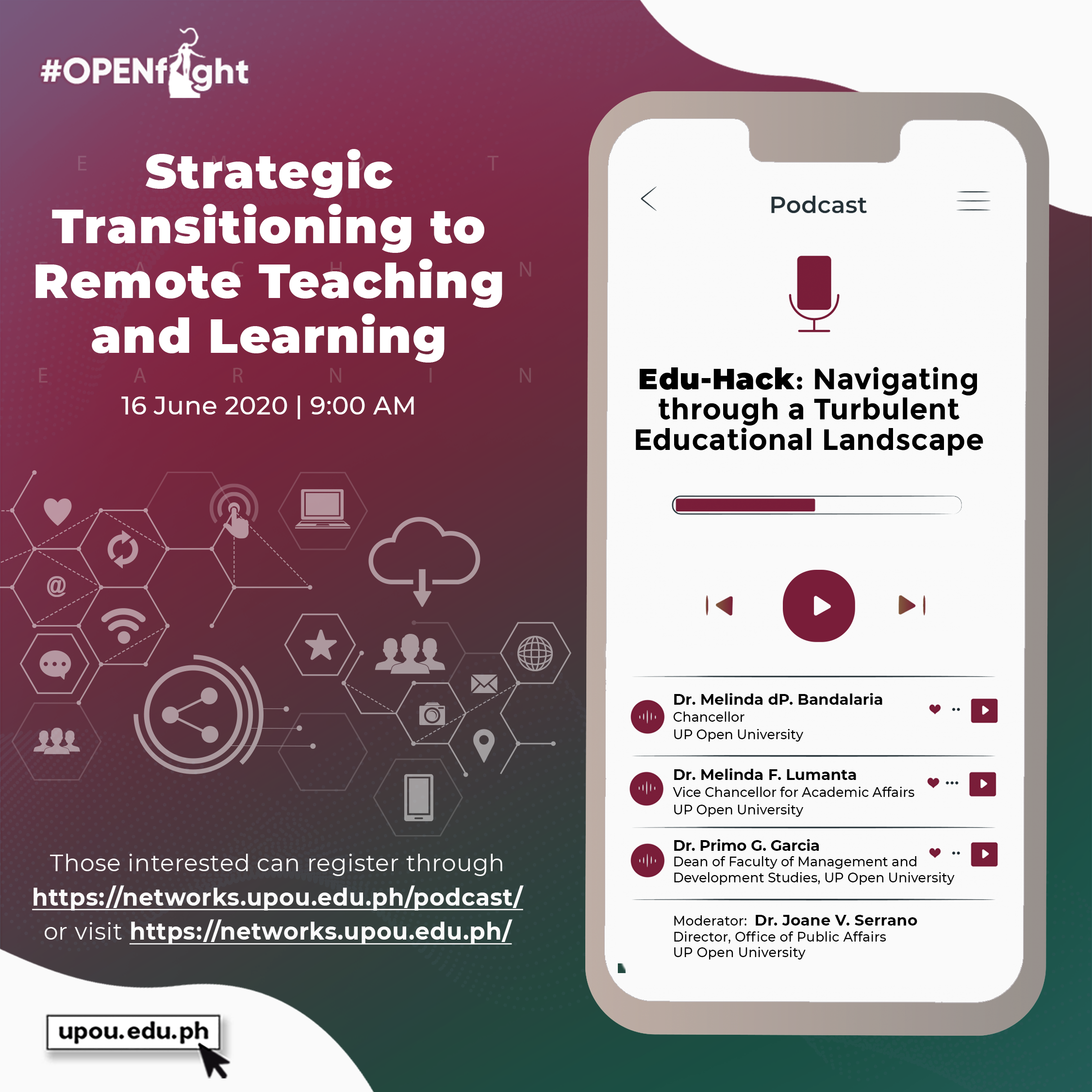
The University of the Philippines Open University (UPOU) conducted the 4th episode of the Edu-Hack podcast series. This time, UPOU tackled “Strategic Transitioning to Remote Teaching and Learning (RTL).” The webinar was conducted on 16 June 2020 and was attended by school teachers, administrators and staff members from different parts of the country and the world.
Three of UPOU’s top experts in Open and Distance eLearning (ODeL) served as panelists for the event. These were Dr. Melinda dela Pena Bandalaria, UPOU Chancellor; Dr. Melinda F. Lumanta, Vice Chancellor for Academic Affairs; and Dr. Primo G. Garcia, Dean of the Faculty of Management and Development Studies. Dr. Joane V. Serrano, Director of the UPOU Office of Public Affairs, served as the moderator.
The webinar focused on discussing various concerns on how academic institutions can strategically prepare for the transition to RTL, the challenges that institutions may face, and practical recommendations that schools and universities may consider to help teachers and administrators with the shift to RTL. It also tackled some of the pressing concerns of students and parents.
Dr. Garcia started the discussion by introducing what RTL is all about and the steps on how to adapt it. Dr. Garcia pointed out that it is the job of the universities to implement transition in a systematic manner. He said, “As you adapt more on flexible modes of delivery, you will need to implement adjustments in your academic and administrative system to manage transitions effectively.”
For Dr. Bandalaria, the first question that university administrators should answer in adapting to the new normal is the kind of instructional delivery that will be suited to the university’s context.
In terms of quality standards in education, Dr. Lumanta said that quality standard measures need to be reviewed, revisited and revised to adapt to the new education model. She added that this should be part of any strategic planning of the institution.
The second topic of the webinar tackled the concerns on how institutions will prepare both administrators and faculty members together with the students and parents in transitioning to remote learning.
Dr. Bandalaria pointed out that managing the resistance among the faculty and staff members of the university is a challenge as they do not completely understand what the change would imply to the kind of work they are used to do. She added that students these days are “techy” which means that it will be easy for them to navigate online tools and resources.
According to Dr. Garcia, “a change in mode of delivery entails the need to consult with the teachers, parents and students to tackle their concerns and difficulties.” Dr. Lumanta, an expert in quality standards, stated, “It is on the course materials development that quality initiatives are most obvious because course materials must be produced and quality checked before it is sent out to students.” She added that there must be a quality circle who will ensure the quality of modules that will be disseminated. She further pointed that flexibility, technology education, agility, equity and sustainability are the hallmarks of a truly open distance and learning system. She hopes that the misconceptions on distance education will somehow be corrected.
The panelists also shared their experiences as faculty members in answering concerns regarding the academic integrity in an online distance learning setting.
Edu-Hack is UPOU’s effort to discuss how Philippine universities are responding and adapting to disruptions in higher education brought about by the COVID-19 pandemic. Edu-Hack is also part of the #OPENFight program, UPOU’s banner program for all efforts towards coping and managing resources amidst the COVID-19 pandemic. To access previous Edu-Hack episodes, visit https://networks.upou.edu.ph/.








